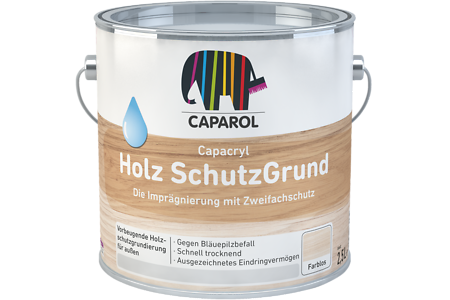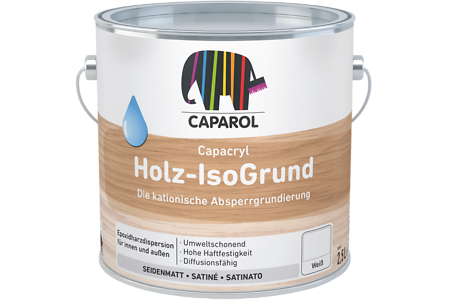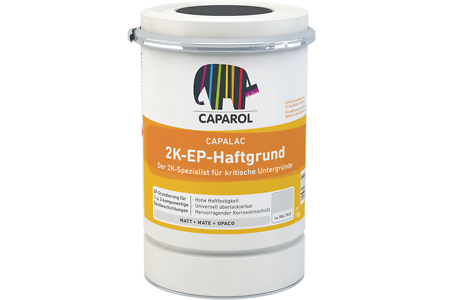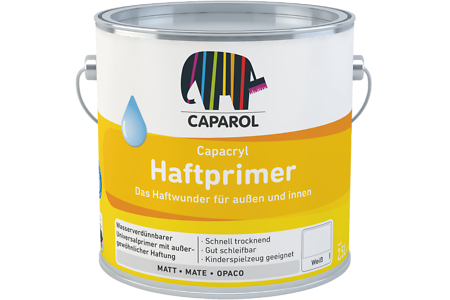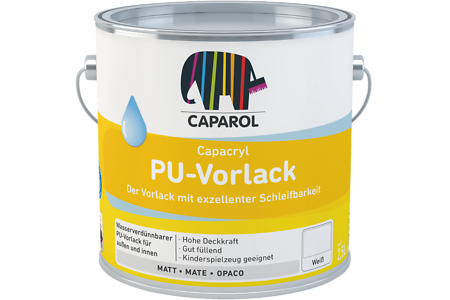Field of Application
For hard-wearing enamel coatings with chemical and mechanical resistance, suitable e.g. for use in public buildings such as playschools, schools, hospitals, catering, storage and production facilities.Material Properties
- Low odour.
- Non-blocking.
- Noble enamel finish.
- High scratch and shock resistance.
- Proper resistance to chemicals.
- Excellent chalking resistance.
- Weather-resistant.
- High cleanability.
- Resistant to disinfectants.
- Resistant to hand perspiration.
Material Base / Vehicle
Two-component acrylic polyurethane enamel, water-dilutable.Packaging/Package Size
- Standard Colour Weiß/White: 750 ml and 2.5 litres, hardener (curing agent) incl.
- ColorExpress: Base W, M and T: 700 ml and 2.4 litres, hardener (curing agent) incl.
Colours
- Standard Colour: Weiß/White
The standard product can be tinted via the ColorExpress stations (Capamix) in many colour shades of e.g. Caparol 3D PLUS Collection, RAL and other colour collections.
When applying colours with lower opacity, such as red, orange or yellow, it is advisable to apply one priming coat using the matching colour shade of our Priming System. Priming System colours are available via the ColorExpress tinting technique for the following products: Capalac Aqua 2 K PU-Lack, Capacryl Haftprimer and Capacryl PU-Vorlack.
Colour Resistance according to German BFS Data Sheet No. 26:
Binder: Class A
Pigmentation: Group 1 to 3, depending on the colour.
Gloss Level
- Silk-matt/semi-gloss (mid sheen; velvet or eggshell-like finish)
Storage
Keep in a cool, but frost-free place.Shelf life: 12 months in original, tightly closed can.
Density
Approx. 1.15 - 1.25 g/cm³Dry temperature resistance
Max. 120 °CNote
| Chemical Resistance following DIN EN ISO 12720 at 20 °C | ||
| Substances used for Testing | Residence Time | Evaluation |
| Aceton | 10 sec | small alteration |
| Butylacetate | 10 sec | no alteration |
| Isopropanol | 2 min | small alteration |
| White spirit | 10 min | no alteration |
| Ammonia | 10 min | no alteration |
| Caustic potash solution | 1 h | small alteration |
| Skin care product (protection cream) | 1 h | no alteration |
| Vinegar | 1 h | no alteration |
| Ethanol | 1 h | small alteration |
| Clean(s)ing agent | 1 h | no alteration |
| Lactic acid | 1 h | no alteration |
| Premium gasoline (4-star) | 1 h | modest alteration |
| Phosphoric acid | 1 h | no alteration |
| Biodiesel | 1 h | small alteration |
| Hand perspiration | 1 h | no alteration |
| Red wine | 6 h (hrs) | modest alteration |
| Mustard | 6 h (hrs) | modest alteration |
| Coffee | 16 h (hrs) | modest alteration |
| Water | 16 h (hrs) | no alteration |
| Cola | 16 h (hrs) | no alteration |
| Explanation: No alteration = No visible changes. The test area is indistinguishable to the ambient surface. Small alteration = The test area is visibly different to the ambient area, but only in case of light reflection, e.g. noticeable due to discolouration or changes in colour or gloss level. The surface texture remains unchanged (no swelling, crack formation or blistering). Modest alteration = The test area is differing to the ambient surface, e.g. due to colour changes, discolouration or variation in gloss level. The surface texture remains unchanged (no swelling, crack formation or blistering). | ||
Suitability according to Technical Information No. 606 Definition of Application Areas
| Interior 1 | Interior 2 | Interior 3 | Exterior 1 | Exterior 2 |
| + | + | + | + | + |
| (–) inapplicable / (○) of limited suitability / (+) suitable | ||||
Suitable Substrates
Prime surfaces of building materials, such as dimensionally stable wooden parts, derived timber products, steel, galvanised steel, zinc sheets, aluminium, copper, unplasticized (rigid) PVC, stable existing coatings in- and outdoors.Do not coat the following surfaces/substrates with Capalac Aqua 2K- PU-Lack:
Stainless steel, anodic/anodized coatings, bronze, brass, surfaces with permanent moisture stress such as showers and swimming pools.
Roofing, flooring, balcony floors, travelled floors.
Limited stable and unstable wood construction elements.
Derived timber material boards and plywood boards (e.g. boards with layers of wood veneer) outdoors.
Substrate Preparation
Wood/Dimensionally Stable Wood Construction Elements:Sand/grind the surface of planed wood in fibre direction, clean thoroughly and remove seeping wood contents, e.g. wood resin/rosin and resin galls, cut sharp edges (Germany: See BFS Data Sheet No. 18). Impregnate wooden parts at risk of blue stain attack outdoors with Capacryl Holzschutz-Grund.
Prime with Capacryl Holz-Isogrund.
Max. wood moisture content (WMC): 12 %.
Iron, Steel:
Derust to industry standard SA 2½ (blasting) or ST3 (mechanically) according to DIN EN ISO 12944-4.
Prime with Capalac Allgrund, Capalac 2K-EP-Haftgrund or Disbon 481 EP-Uniprimer.
Zinc/Galvanised Surfaces, Unplasticized (Rigid) PVC:
Wash with light ammonia solution using sanding pad according to German BFS Data Sheets No. 5 and No. 22 or clean with Multistar 1 : 5 diluted with tap (potable) water using non-woven web. Prepare large galvanised surfaces (zinc) by sweeping technique.
One priming coat of Capacryl Haftprimer.
Aluminium, Copper:
Clean with non-woven web and Multistar, 1 : 5 diluted with tap water. Germany: Follow BFS Data Sheet No. 6.
One priming coat of Capacryl Haftprimer.
Existing Paint Coatings:
Roughen/sand the surface of existing coats slightly and/or treat with alkali. Carefully remove unstable coatings. Prime stable existing coatings with Capacryl Haftprimer. Prepare and prime substrates (when existing coatings have been removed) depending on substrate requirements.
Preparation of Material
Add the hardener (catalyst) to the base, directly before use. Stir intensely by hand or use low-speed paddle mixer (agitator; max. 400 rpm). Then pour into another clean mixing vessel and stir again very thoroughly.The material temperature of both components should be 15 °C to 20 °C.
Mixing Ratio
Base : hardener = 9 : 1 parts by volume orBase : hardener = 100 g : 9.8 g parts by weight
Method of Application
Guidelines for Spray Application✱:
| Ø Nozzle | Spray Pressure | Air Pressure | Dilution | |
| Airless | 0.010 - 0.012 inch | 220 bar | – | - |
| Airmix/Aircoat | 0.010 - 0.012 inch | 200 - 220 bar | 2.0 - 2.5 bar | - |
| Caparol NAST Wagner XVLP FinishControl 5000 | NAST-Frontend (Colour: blue) | Air quantity 2/3 | _ | 10 % |
| High pressure | 1.8 - 2.0 mm | – | 2.5 bar | 15 % |
Application:
Capalac Aqua 2k PU-Lack can be applied by enamel brush, enamel roller or with spraying equipment. Particularly for spray painting the local prescriptions for environment protection and industrial safety regulations for using isocyanate containing products must be followed.
Use special brushes, suitable for "aqua-type" (waterborne) enamels , such as Orel-Mix, Friess Blueline or Wistoba 1528 Krex . On larger surfaces apply the product with a short pile (textured) polyamide (nylon) roller and directly roll over with a fine-porous foamed plastic roller or use aqua enamel type brush for reworking.
Thinning
Capalac Aqua 2K PU-Lack is ready-to-use for application with enamel brush and roller. Dilution is not necessary.Dilution with tap (potable) water is possible for spray application, depending on device and spraying method.
Surface Coating System
| Substrate | Use | Substrate Preparation | Impregnation | Priming Coat | Intermediate Coat 1) | Finishing Coat |
| Wood, derived timber products | interior | sand/clean | – | Capacryl Holz-IsoGrund 2) | Capalac Aqua 2K PU-Lack or Capacryl PU-Vorlack 3) | Capalac Aqua 2K PU-Lack 4) |
| Dimensionally stable wood | exterior | BFS Nr. 18 | Capacryl Holzschutz-Grund | Capacryl Holz-IsoGrund 2) | ||
| Iron, steel | interior | derust/clean | – | Capalac 2K-EP-Haftgrund or Disbon 481 EP-Uniprimer | ||
| Iron, steel | exterior | derust/clean | – | Capalac 2K-EP-Haftgrund or Disbon 481 EP-Uniprimer | ||
| Zinc (galvanised steel) | interior/exterior | BFS No. 5 | – | Capacryl Haftprimer | ||
| Aluminium/copper | interior/exterior | BFS No. 6 | – | Capacryl Haftprimer | ||
| Rigid PVC | interior/exterior | BFS No. 22 | – | Capacryl Haftprimer | ||
| Stable Existing Paint Coatings 5) | interior/exterior | roughening/alkali treatment | Prepare and prime defective areas depending on substrate requirements | Capacryl Haftprimer |
| 1) Apply two intermediate coats on dimensionally stable wood component parts, in compliance with BFS Data Sheet No. 18. 2) Always apply Capacryl Holz-IsoGrund on wood with water-soluble, discolouring substances of content that leave marks (2x for knots). 3) Intermediate coat, tinted to match the finishing coat in shade. For reddish, yellowish or orange shades with low opacity (hiding/covering power) a differing colour is mixed via ColorExpress, providing for a better hiding power of the finishing coat. This colour is somewhat differing to provide for a better hiding power of the top coat. 4) An additional coat may be necessary when colours of low opacity are used (e.g. shades of yellow/red/orange). 5) Note: Adhesion must be tested in advance for powder coatings, coil coatings and other critical substrates by trial coatings on site. |
Consumption
Approx. 100 - 120 ml/m2 per coat.Consumption is only a guide value and may vary, depending on substrate requirements. Determine the exact amount of material required by coating a test area on site.
Workability
(Pot Life)2 hours at 20 °C. Higher temperatures shorten, lower temperatures extend the pot life.
Note! The end of pot life is not visible. Exceeding of pot life as well as overdosage or underfeeding of hardener leads dramatically to a loss of product properties.
Application Conditions
Low Temperature Limit During Application & Drying:8 °C for product, ambient air and substrate.
Drying/Drying Time
| At 20 °C and 65 % relative humidity (RH). | dust dry | recoatable | cured |
| after hours | 1 - 2 | 10 - 12 | 48 |
Tool Cleaning
Immediately after use with clean water.Special Risks (Hazard Note) / Safety Advice (Status as at Date of Publication)
Product: For professional users only.Base:
Keep out of reach from children. Ensure good ventilation during use and drying. Do not eat, drink or smoke while using the product. In case of contact with eyes or skin, immediately and thoroughly rinse with water. Do not allow product to enter drains, waterways or soil. Clean utensils immediately after use with soap and water. Use P2 dust filter for grinding. Do not breathe spray dust. Use A2/P2 combination filter for paint spraying.
Contains 1,2-benzisothiazol-3(2H)-one, adipohydrazide, 2-methyl-2Hisothiazol-3-one. May produce an allergic reaction.
Safety data sheet available on request.
In Germany: Advice for allergy sufferers with isothiazolinone allergy: Hotline 0180/5308928
(0.14 €/minute from German landline, MTS max. 0.42 €/minute).
Hardener:
May cause an allergic skin reaction. Harmful if inhaled. May cause respiratory irritation. Harmful to aquatic life with long lasting effects. Do not breathe vapours/ spray. Do not get in eyes, on skin, or on clothing. Avoid release to the environment. Wear protective gloves/ protective clothing/eye protection/ face protection. IF INHALED: Remove person to fresh air and keep comfortable for breathing. Call a POISON CENTER or doctor/ physician if you feel unwell. IF ON SKIN: Wash with plenty of soap and water.
Contains isocyanates. May produce an allergic reaction.
Disposal
Materials and all related packaging must be disposed of in a safe way in accordance with the full requirements of the local authorities. Particular attention should be made to removing wastage from site in compliance with standard construction site procedures.In Germany: Only completely empty containers should be handed in for recycling. Dispose containers with residues of liquid product via waste collection point accepting old paints and
enamels. Dispose dried/hardened product residues as construction site/demolition/municipal or domestic waste.
EU limit value for the VOC content
of this product (category A/d): max. 130 g/l (2010). This product contains max. 110 g/l VOC.Product Code Paints and Enamels
PU 50 (Germany)Substances of Content - Declaration
Base:Polyurethane acrylate resin, titanium dioxide, coloured pigments, mineral fillers, water, glycols, glycol ether, additives, preservative (Methyl-/Benzisothiazolinone).
Hardener:
Aliphatic polyisocyanate, glycol ether.
Further Details
See Material Safety Data Sheet (MSDS).Customer Service Centre
Tel.: +49 6154 71-71710Fax: +49 6154 71-71711
e-mail: kundenservicecenter@caparol.de
International Distribution: Please see www.caparol.com







